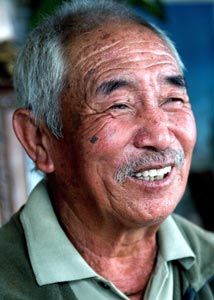Name: Lhakpa Tsering
(Alias: No)
Gender: Male
Interview Age: 72
Date of Birth: 1935
Birthplace: Shari, Utsang, Tibet
Year Left Tibet: 1960
Profession: Transportation
Monk/Nun: No
Political Prisoner: Yes

Interview No.: 69
Date: 2007-07-04
Language: Tibetan
Location: Lugsung Samdupling Settlement, Bylakuppe, Karnataka, India
Categories: Oppression and Imprisonment
Keywords: childhood memories, children's games, Chinese -- oppression under, Chinese rule -- life under, escape experiences, farm life, festivals, imprisonment, refugee in India -- life as, trade, Utsang
Summary:
Lhakpa Tsering's family engaged in farming and transportation work in Domo. He talks about childhood memories, such as playing a game of bows and arrows with his friends, and transporting goods on mules between Phari and Kalimpong.
Lhakpa Tsering recalls the Chinese arrived in his village when he was 13 years old and then "everything was in chaos and they caused misery." He describes the numerous hardships imposed on the Tibetan people, including the daily arrest of 15 to 20 people from his village without any specific reason. To avoid being arrested, he and other young men hid themselves in the hills for a week.
After the Dalai Lama left for India in 1959, the Chinese suspected that many Tibetans, such as Lhakpa Tsering, might flee and they began making more arrests. Lhakpa Tsering and his wife were kept in prison for six months and then released with a strict warning that "if you are caught [fleeing], you'll never leave the prison." He and four others escaped to India in 1960. He says, "Though life was difficult working as road construction workers, we were happy because there was no fear of being captured."
Interview Team:
- Martin Newman (Interviewer)
- Lhakpa Tsering (Interpreter)
- Jeff Lodas (Videographer)

